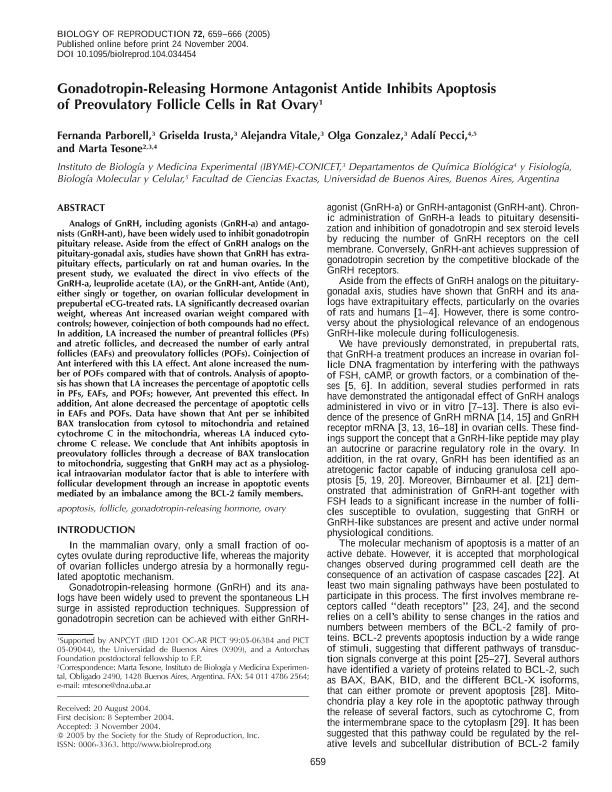Artículo
The GnRH antagonist Antide inhibits apoptosis of preovulatory follicle cells in rat ovary
Parborell, Maria Fernanda Agustina ; Irusta, Griselda
; Irusta, Griselda ; Vitale, Alejandra Mariel
; Vitale, Alejandra Mariel ; Gonzalez, Olga; Pecci, Adali
; Gonzalez, Olga; Pecci, Adali ; Tesone, Marta
; Tesone, Marta
 ; Irusta, Griselda
; Irusta, Griselda ; Vitale, Alejandra Mariel
; Vitale, Alejandra Mariel ; Gonzalez, Olga; Pecci, Adali
; Gonzalez, Olga; Pecci, Adali ; Tesone, Marta
; Tesone, Marta
Fecha de publicación:
03/2005
Editorial:
Oxford University Press
Revista:
Biology of Reproduction
ISSN:
0006-3363
e-ISSN:
1529-7268
Idioma:
Inglés
Tipo de recurso:
Artículo publicado
Clasificación temática:
Resumen
Analogs of GnRH, including agonists (GnRH-a) and antagonists (GnRH-ant), have been widely used to inhibit gonadotropin pituitary release. Aside from the effect of GnRH analogs on the pituitary-gonadal axis, studies have shown that GnRH has extrapituitary effects, particularly on rat and human ovaries. In the present study, we evaluated the direct in vivo effects of the GnRH-a, leuprolide acetate (LA), or the GnRH-ant, Antide (Ant), either singly or together, on ovarian follicular development in prepubertal eCG-treated rats. LA significantly decreased ovarian weight, whereas Ant increased ovarian weight compared with controls; however, coinjection of both compounds had no effect. In addition, LA increased the number of preantral follicles (PFs) and atretic follicles, and decreased the number of early antral follicles (EAFs) and preovulatory follicles (POFs). Coinjection of Ant interfered with this LA effect. Ant alone increased the number of POFs compared with that of controls. Analysis of apoptosis has shown that LA increases the percentage of apoptotic cells in PFs, EAFs, and POFs; however, Ant prevented this effect. In addition, Ant alone decreased the percentage of apoptotic cells in EAFs and POFs. Data have shown that Ant per se inhibited BAX translocation from cytosol to mitochondria and retained cytochrome C in the mitochondria, whereas LA induced cytochrome C release. We conclude that Ant inhibits apoptosis in preovulatory follicles through a decrease of BAX translocation to mitochondria, suggesting that GnRH may act as a physiological intraovarian modulator factor that is able to interfere with follicular development through an increase in apoptotic events mediated by an imbalance among the BCL-2 family members.
Archivos asociados
Licencia
Identificadores
Colecciones
Articulos(IBYME)
Articulos de INST.DE BIOLOGIA Y MEDICINA EXPERIMENTAL (I)
Articulos de INST.DE BIOLOGIA Y MEDICINA EXPERIMENTAL (I)
Citación
Parborell, Maria Fernanda Agustina; Irusta, Griselda; Vitale, Alejandra Mariel; Gonzalez, Olga; Pecci, Adali; et al.; The GnRH antagonist Antide inhibits apoptosis of preovulatory follicle cells in rat ovary; Oxford University Press; Biology of Reproduction; 72; 3; 3-2005; 659-667
Compartir
Altmétricas



